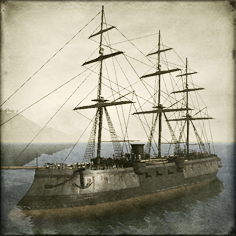
Basic Unit Statistics (can be modified by difficulty level, arts, skills, traits and retainers)
| Recruitment Cost | 10000 | |
| Upkeep Cost | 1080 | |
| Marines | 30 | 25% |
| Seamen | 20 | 10% |
| Gunners | 24 | 14% |
| Accuracy | 10 | 14% |
| Reloading Skill | 10 | 25% |
| Hull Strength | 6000 | 60% |
| Morale | 19 | 38% |
Strengths & Weaknesses
- Medium-speed ironclad vessel
- Large crew
- Excellent range and accuracy
- Excellent morale
- Large number of guns
Abilities
- Fast Reload - This increases the reload skill of a ship's crew for a short period of time.
- Overheat Engine - This increases a ship's speed for a short period of time.
- Ramming - This ship can ram others, causing damage to both the enemy and itself.
Description
Large vessels, the Ocean class ironclads are heavily armoured, and possess excellent long-ranged and accurate guns.
Ocean class ironclads are an improved version of the French "Provence" class. They are screw-driven battleships fitted with metal-reinforced rams below the waterline that make them particularly deadly to smaller wooden vessels. They have excellent range and accuracy and the crew has exceptionally high morale. The crew are armed with rifles, ready to repel any boarding attacks from those ships fortunate enough to get close enough to attack. The sheer size of these warships makes them ideal for large naval engagements at sea, but they are less suited to small scale port battles as they are less manoeuvrable than some of their smaller counterparts. The Ocean class ironclads were designed by French naval architect Henri Dupuy de Lome. He was educated at the Ecole Polytechnique and spent some time studying in England. His radical ideas about ship design were not immediately welcomed on his return to France, but after the construction of "Le Napoleon", the first ever screw-driven battleship, there were few who questioned his methods. His inventiveness was not confined to the conventional. In 1870 Dupuy de Lome put his considerable experience to use designing the first ever navigable balloon. The French government provided him with anything he required, including large amounts of money, to complete the project. The 'Dupuy de Lome' became the first operational airship and was used to great effect during the Franco-Prussian War.